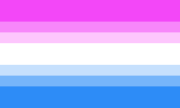
Back ثنائية الشغف الجنسي Arabic বাই-কিউৰিয়াছ Assamese উভকামিতা-কৌতুহলী Bengali/Bangla Damzivrevelezh Breton Bi-curious Czech Deu-chwilfrydig Welsh Bicuriosidad Spanish کنجکاو-دوگانه Persian Bi-curious Finnish Bicuriosité French
| Sexual orientation |
|---|
 |
| Sexual orientations |
| Related terms |
| Research |
| Animals |
| Related topics |
| Part of a series on |
| LGBTQ topics |
|---|
|
|
| Flag | |
|---|---|
 |
Bi-curious (sometimes bicurious) is a term for a person, usually someone who is a self-identified heterosexual, who is curious or open about engaging in sexual activity with a person whose sex differs from that of their usual sexual partners.[1][2][3] The term is sometimes used to describe a broad continuum of sexual orientation between heterosexuality and bisexuality.[4] Such continuums include mostly heterosexual or mostly homosexual, but these can be self-identified without identifying as bisexual.[5][6] The terms heteroflexible and homoflexible are mainly applied to bi-curious people, though some authors distinguish heteroflexibility and homoflexibility as lacking the "wish to experiment with sexuality" implied by the bi-curious label. It is important when discussing this continuum to conclude that bisexuality is distinct from heterosexuality and homosexuality rather than simply an extension of said sexualities like the labels heteroflexibility and homoflexibility would imply, due to the prominent erasure and assimilation of bisexuality into other identity groups.[5] To sum it up, the difference between bisexual and bicurious is that bisexual people know that they are sexually attracted to both genders based on personal experience. Bicurious people are still maneuvering their way through their sexuality.[7][8]
Bi-curious is not to be confused with forms of sexual fluidity, defined as a "capacity for situation-dependent flexibility in sexual responsiveness,"[9] as bi-curious implies the existence of one set sexuality for the individual who carries the label, even if it is currently unknown, rather than an acknowledgment that the individual's sexual preference has changed and will continue to change that comes with sexual fluidity.
- ^ "Definition of BI-CURIOUS". www.merriam-webster.com. Retrieved 2019-09-21.
Characterized by an openness to or curiosity about having sexual relations with a person whose sex differs from that of one's usual sexual partners : curious about exploring or experimenting with bisexuality.
- ^ Wilson G, Rahman Q (2008). Born Gay: The Psychobiology of Sex Orientation. Peter Owen. p. 15. ISBN 978-1784506636.
The term 'bi-curious' refers to that fact that many people who are basically straight might consider an occasional homosexual adventure simply to broaden their horizons.
- ^ Holleb ML (2019). The A-Z of Gender and Sexuality: From Ace to Ze. Jessica Kingsley Publishers. p. 43. ISBN 978-1784506636.
Someone who considers themselves heterosexual but has a sexual or romantic 'curiosity' toward the same gender.
- ^ Frank, Katherine (August 2008). "'Not Gay, but Not Homophobic': Male Sexuality and Homophobia in the 'Lifestyle'". Sexualities. 11 (4): 435–454. doi:10.1177/1363460708091743. ISSN 1363-4607.
- ^ a b Ross, Lori E.; Salway, Travis; Tarasoff, Lesley A.; MacKay, Jenna M.; Hawkins, Blake W.; Fehr, Charles P. (2018). "Prevalence of Depression and Anxiety Among Bisexual People Compared to Gay, Lesbian, and Heterosexual Individuals:A Systematic Review and Meta-Analysis". Journal of Sex Research. 55 (4–5): 435–456. doi:10.1080/00224499.2017.1387755. ISSN 1559-8519. PMID 29099625.
- ^ Savin-Williams, Ritch C.; Joyner, Kara; Rieger, Gerulf (2012-02-01). "Prevalence and Stability of Self-Reported Sexual Orientation Identity During Young Adulthood". Archives of Sexual Behavior. 41 (1): 103–110. doi:10.1007/s10508-012-9913-y. ISSN 1573-2800. PMID 22302504.
- ^ Smorag, Pascale (14 May 2008). "From Closet Talk to PC Terminology: Gay Speech and the Politics of Visibility". Transatlantica (1). doi:10.4000/transatlantica.3503. Retrieved February 13, 2011.
- ^ "What Is Bicurious?". WebMD. Retrieved 2022-02-19.
- ^ Diamond, Lisa M. (2016-12-01). "Sexual Fluidity in Male and Females". Current Sexual Health Reports. 8 (4): 249–256. doi:10.1007/s11930-016-0092-z. ISSN 1548-3592.